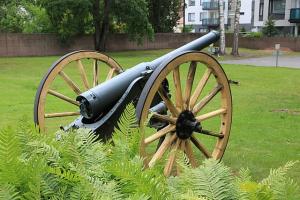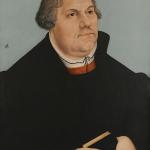
“Please Hit ‘Subscribe’”! If you have received benefit from this or any of my other 4,600+ articles, please follow this blog by signing up (with your email address) on the sidebar to the right (you may have to scroll down a bit), above where there is an icon bar, “Sign Me Up!”: to receive notice when I post a new blog article. This is the equivalent of subscribing to a YouTube channel. Please also consider following me on Twitter / X and purchasing one or more of my 55 books. All of this helps me get more exposure, and (however little!) more income for my full-time apologetics work. Thanks so much and happy reading!
***
Anti-Catholic Reformed Protestant polemicist James Swan, of Boors All infamy, wrote an article about a CARM discussion: itself entitled, “Who Gave the Reformers Authority?” (7-31-07). His words will be in blue; a Catholic interlocutor’s on the board in green.
You forget the Church came before the Bible!
No, God is the primary author of Scripture. He is the source behind it.
No kidding. No one denies that. The point is obviously a chronological one. If we’re talking about he New Testament, the earliest books were the Epistle to the Galatians (c. 48) and 1 Thessalonians (c. 50). The Church began on the Day of Pentecost (see Acts 2), right after Jesus’ Ascension (30-33 or so).
The same Gospel in the New Testament was preached in the Old Testament (Gal. 3:5-14).
Abraham knew of a sort of proto-gospel of justification by faith, as Paul explains. But of course that’s technically not the Gospel, as I just explained in a recent post replying to Swan. St. Paul defines the gospel in Acts 13:16-41 as the Resurrection of Jesus (vss. 32-33), and in 1 Corinthians 15:1-8 as His death, burial, and Resurrection (cf. 2 Tim 2:10-11). Moreover, the problem with Protestants and Abraham is that the Bible teaches that he was justified twice by works & once by faith.
The basic Gospel truths were based on the Old Testament,
There were certainly many messianic passages (I love them), but it was still a very primitive kernel.
and were later inscripturated in the writing of the New Testament. The doctrine was the same before it was written.
Not quite. As Paul wrote nine verses after what Swan cited:
Galatians 3:23-27 (RSV) Now before faith came, we were confined under the law, kept under restraint until faith should be revealed. [24] So that the law was our custodian [KJV, “tutor”] until Christ came, that we might be justified by faith. [25] But now that faith has come, we are no longer under a custodian; [26] for in Christ Jesus you are all sons of God, through faith. [27] For as many of you as were baptized into Christ have put on Christ. (cf. Phil 4:15: “the beginning of the gospel” in Paul’s lifetime; and 2 Tim 1:10: “manifested through the appearing of our Savior Christ Jesus, who abolished death and brought life and immortality to light through the gospel.”)
Matthew also wrote about the advent of the gospel:
Matthew 4:13-16 and leaving Nazareth he went and dwelt in Caper’na-um by the sea, in the territory of Zeb’ulun and Naph’tali, [14] that what was spoken by the prophet Isaiah might be fulfilled: [15] “The land of Zeb’ulun and the land of Naph’tali, toward the sea, across the Jordan, Galilee of the Gentiles — [16] the people who sat in darkness have seen a great light, and for those who sat in the region and shadow of death light has dawned.”
How do you know what constitutes the New Testament canon?
Since God is the primary author of his Word, I trust in his divine providence to reveal His word to His church. So, I “know,” because God has spoken.
Yes, God spoke through the Catholic Church in the late 4th century (Councils of Hippo and Carthage), which finalized the NT canon and the OT canon, including the Deuterocanon that Protestants reject. If we are to go just by individual Christians, then the first to list all 27 NT books in one place was Athanasius in 367 AD. It took more than 330 years after Christ for anyone to figure that out.
How do you know for certain that these 27 books here in your New Testament are in fact inspired and should be in the New Testament?
This is basically the question of an atheist.
Not at all. It’s a basic epistemological and fundamental question that all Christians (at least ones who think seriously about the faith) must grapple with: how do we know that our “holy books” are in fact that? On what basis? The Catholic view is coherent and self-consistent. The Protestant view isn’t. As the Presbyterian R. C. Sproul famously put it, Protestants have a “fallible collection of infallible books” (because they deny the biblical doctrine of the infallibility of the Church).
It assumes that God does not have purposes in revealing His Word, and that He is incapable of protecting and preserving that Word.
It does no such thing. It simply inquires as to how we know that the NT is what it is.
The canon is the result of God’s purposes. It is God who preserves His Word for His church. The Church, or the people of God, hear the voice of God. If the people of God are indwelt with the Spirit of God, would it not make sense that they will hear the voice of God when He speaks?
That’s all well and good, but it’s simply a string of truisms. It still remains the case that the Protestant has to have a rational, objective way to know the extent of the biblical canon. It can’t be merely subjective piety. It’s not so simple to determine the books on our own (which is why it took so long, historically). See:
The New Testament Canon & Historical Processes [1996]
Are All Bible Books Self-Evidently Inspired? [6-19-06]
Are All the Biblical Books Self-Evidently Canonical? [6-22-06]
Were Apostles Always Aware of Writing Scripture? (6-29-06; abridged on 9-25-16)
Conundrum! Scripture Alone Cannot Establish the Biblical Canon [National Catholic Register, 5-16-17]
The New Testament Canon is a “Late” Doctrine [National Catholic Register, 1-22-18]
Is Inspiration Immediately Evident in Every Biblical Book? [National Catholic Register, 7-28-18]
But this does not mean the people of God must be infallible in order to hear it.
That’s correct. They simply had to accept the authority of the Catholic Church, which was established by Jesus Christ Himself, when He made St. Peter the first leader of the Church (i.e., the first pope).
The Roman Catholic Church did not have an infallible declaration of the canon until 1546,
The earlier councils taught infallibly, after they were confirmed by popes. Trent simply made it a higher level of infallibility, since it was an ecumenical council.
yet, we find the people God previous to this able to know and use Scripture.
Yes, based on the decrees of Carthage and Hippo,. spearheaded by St. Augustine.
In other words, the question assumes the need for an infallible Church to announce the canon, but when this paradigm is used to interpret church history, it fails to make sense of reality.
The canon didn’t come from nowhere. There was a very broad consensus, but also a lot of disagreement; then the Church settled the issue, as a necessary authority and the “final say.”
*
Practical Matters: Perhaps some of my 4,600+ free online articles (the most comprehensive “one-stop” Catholic apologetics site) or fifty-five books have helped you (by God’s grace) to decide to become Catholic or to return to the Church, or better understand some doctrines and why we believe them.
Or you may believe my work is worthy to support for the purpose of apologetics and evangelism in general. If so, please seriously consider a much-needed financial contribution. I’m always in need of more funds: especially monthly support. “The laborer is worthy of his wages” (1 Tim 5:18, NKJV). 1 December 2021 was my 20th anniversary as a full-time Catholic apologist, and February 2022 marked the 25th anniversary of my blog.
PayPal donations are the easiest: just send to my email address: [email protected]. Here’s also a second page to get to PayPal. You’ll see the term “Catholic Used Book Service”, which is my old side-business. To learn about the different methods of contributing (including Zelle), see my page: About Catholic Apologist Dave Armstrong / Donation Information. Thanks a million from the bottom of my heart!
*
***
*
Photo Credit: The 1870s de Bange 90 mm cannon on the yard of Eastern Finland military office in Mikkeli, South Savonia, Finland [public domain/ Wikimedia Commons]
Summary: Anti-Catholic Protestant polemicist James Swan is out to sea when it comes to the New Testament canon. I interact with his dubious claims made on the CARM Protestant forum.













